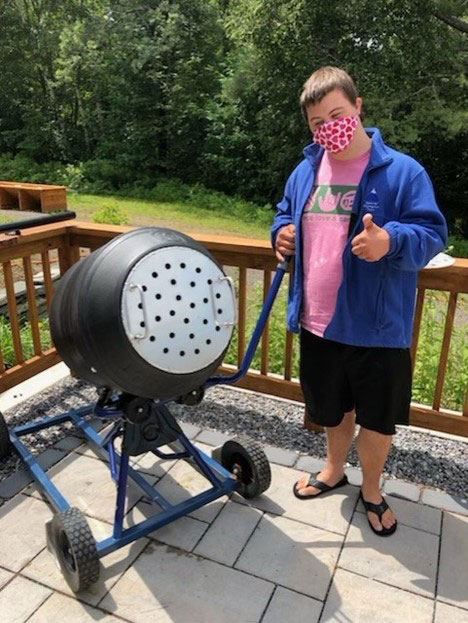We know many will agree with the sentiment that backyard composting is a lot of fun, and you don’t need expertise to do it right. But the truth is, composters are not designed with everyone in mind. The backyard composting systems on the market can be cumbersome and require physical strength and space that many people do not have. This reality came to the forefront for the Natural Resources Council of Maine (NRCM) when Adaptive Outdoor (AO) requested help developing an onsite composter for their new day-use facility gardens in Brunswick.
AO is doing powerful work, making Maine’s great outdoors accessible to people of all abilities. Maine’s places are, too often, built for one type of imaginary “average” person. AO is changing that and inspiring others like us, along the way.

Jared, a student at AO, with the newly designed composter
To help AO, we needed to make a composter that a diversity of people could use, one that could turn automatically so that people with low upper body strength or who are living with a prosthesis could use it. The composter needed to sit low to the ground and be stable. It also needed to be side-loading so that a child or someone using a wheelchair could access it. It needed to be easy to empty and easy to move around.
On top of those requirements, it needed to do all the things that composters are supposed to do, like keep compost warm, allow oxygen to flow, and keep animals out.
Armed with this wish list, we called up Region 10 Technical High School in Brunswick for help. Gerry St. Denis, the school’s welding instructor, volunteered his class to build the composter without hesitation. He almost immediately knew what his class needed to do: modify a new cement mixer.
Turns out, home cement mixers meet a lot of the criteria. They are the right size. They spin automatically with the touch of an on/off button. They have fins on the inside of the barrel to help circulate material and air. All Gerry’s class would need to do is lower the barrel, make a lid, and put some holes in for airflow. With this plan, NRCM went to work purchasing the cement mixer for the project.
Gerry’s class did a fantastic job. Not only did they build the basics, they put the composter on wheels so that AO’s garden tractor can tow it around. They also made a weatherproof housing for the on/off button. They added a safety chain so that the barrel doesn’t tip unintentionally. And they did all this during the pandemic school year.
This project has been such a great learning experience. With a little creativity and a can-do attitude, we can make protecting the environment easier for people of all abilities. If you too find standard composters hard to use, try these things to make it easier:
- Use a cordless drill auger to mix and aerate the compost piles.
- If you have a tractor, you can use open bay style compost piles to mix and move compost.
- Barrel style composters can be easily turned. If you want to automate turning, try converting your own cement mixer!
- If you want to divert food waste from the landfill, but don’t need the compost, you can buy a backyard digestor to return food waste to the soil.
- You can let worms do the work for you with vermicomposting.
NRCM wants to give a big “thank you” to the students at Region 10 who made this project happen, and to Adaptive Outdoor for working with us on this project.











Hi – I’m coauthor of the column Rubbish: Dispatches from the Wasteland in the Lincoln County News. I met recently with the new principal of the So. Bristol elementary school where my granddaughter begins the 8th grade this year. He was particularly interested in creating a school compost program. When I clicked on the link to grant, this page came up. I’d like to put into the principal’s hands a direct link to the grant program. Thanks.. Michael Uhl
Here is the link right to the grant application, Michael: https://docs.google.com/forms/d/e/1FAIpQLSc5boCg21mzkS9bAOEtsepdTtQ_V-xPvW0ahtZxGQ79tP2aGg/viewform?c=0&w=1